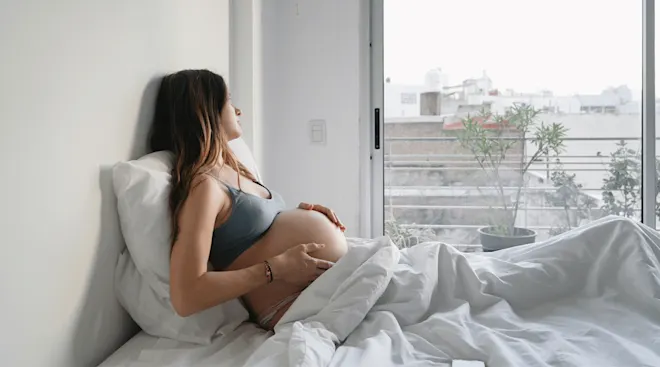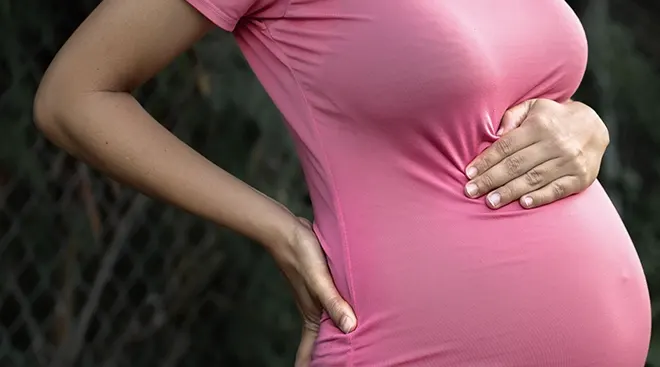What’s the Deal With So-Called ‘Pregnancy Glow?’
“Wow, you look like you’re glowing!” If you’re pregnant, you may have heard something to this effect more than once, whether it’s from a curious relative or the checkout clerk at the grocery store. Maybe you’ve even done a double-take in the mirror at your new and improved pregnancy skin. It’s also possible that all this has led you to wonder: Is pregnancy glow real, or is it just one of those mom-to-be myths? Well, experts say pregnancy glow is an actual medical occurrence—so get ready to shine! Here’s why you may experience glowing skin in pregnancy.
“Pregnancy glow is the vibrant, radiant, fresh look many women show on their face while pregnant,” says Laura Purdy, MD, MBA, a family medicine physician and the chief medical officer of Wisp, a sexual and reproductive telehealth service. “Others may have a flushed face with rosy cheeks. Some [people] look refreshed and almost glowing or shiny when pregnant, which is where the term came from.” Of course, it’s not a universal experience, and not everyone will experience glowing skin in pregnancy.
Pregnancy glow is caused by the physiological changes your body undergoes during pregnancy, including:
- Rising hormone levels. Estrogen and progesterone rise during pregnancy in order to keep you healthy and help baby grow, explains Ruth O. Arumala, DO, MPH, a gynecologist, cosmetic surgeon and co-chief medical officer of Zuri Fertility. These hormones can also help give you that glowy look: “They stimulate the sebaceous glands on the skin to produce more oil,” Arumala says.
- Increased blood flow. Pregnant people experience more blood flow, Purdy says, which can make your face look rosier. Research shows that a pregnant person’s blood volume increases by 45 percent.
- Higher body temperature. Purdy says your body temperature can rise during pregnancy, leading to a flushed look.
Although the timing of glowing skin in pregnancy varies from person to person, pregnancy glow usually starts during the second trimester, Arumala says.
Your friends and family might be eager to find out baby’s sex using “clues” like your pregnancy glow (or lack thereof). You can confidently tell them the expert’s take: “This is a myth,” Arumala says. “The pregnancy glow can occur with either sex.”
While that lovely pregnancy glow is undoubtedly a welcome result of expecting, pregnancy can also lead to a host of less-than-pleasant skin issues. “Not everyone feels the same symptoms when pregnant, both good and bad, and everyone’s bodies and experiences are different,” Purdy says. Other skin-related side effects you might face in pregnancy include:
- Breakouts. The same hormones that cause pregnancy glow can lead to acne. “When your face is more oily, which is a cause of pregnancy glow, it can cause more breakouts,” says Purdy.
- Stretch marks. “They’re tiny tears in the layers of tissue under your skin that get pulled on the body while pregnant,” Purdy explains. “You’ll most likely notice them on your belly, butt, thighs, hips or breasts as that skin stretches as baby grows.”
- Skin tags. These can also pop up because of how fast your belly is growing, says Purdy.
- Dry skin. Dryness can happen when you’re dehydrated, which is common while pregnant, Purdy says.
- Melasma. Melasma is a common and harmless condition that results in darker patches of skin. “This can be from both hormonal factors and environmental factors like sun exposure,” says Purdy. Scars, freckles and other dark spots may appear darker, and your nipples might become a deeper hue, too, as a result of pregnancy hyperpigmentation, Arumala adds.
- Linea nigra. This is a dark line down the middle of your belly that will likely fade in the weeks and months after birth.
- Spider and varicose veins. “Vascular lesions like spider veins occur more commonly in light-skinned individuals starting in the second trimester,” says Arumala. “They usually look like red lesions with branches.” These are most common in the upper body, and usually go away around three months postpartum, she says.
Pregnancy brings a variety of physiological changes that can be less than enjoyable. Fortunately, pregnancy glow is one symptom of pregnancy you can actually look forward to. Enjoy this moment of radiance.
Please note: The Bump and the materials and information it contains are not intended to, and do not constitute, medical or other health advice or diagnosis and should not be used as such. You should always consult with a qualified physician or health professional about your specific circumstances.
Plus, more from The Bump:
Ruth O. Arumala, DO, MPH, FACOG, NCMP, is a gynecologist, cosmetic surgeon and co-chief medical officer of Zuri Fertility. She earned her medical degree from Rowan University School of Osteopathic Medicine in New Jersey.
Laura Purdy, MD, MBA, is a family medicine physician and the chief medical officer of Wisp, a sexual and reproductive telehealth service. She earned her medical degree from the Uniformed Services University of the Health Sciences in Bethesda, Maryland.
Cardiovascular Journal of Africa, Physiological Changes in Pregnancy, March-April 2016
American College of Obstetricians and Gynecologists, Skin Conditions During Pregnancy, July 2022
Navigate forward to interact with the calendar and select a date. Press the question mark key to get the keyboard shortcuts for changing dates.




















































